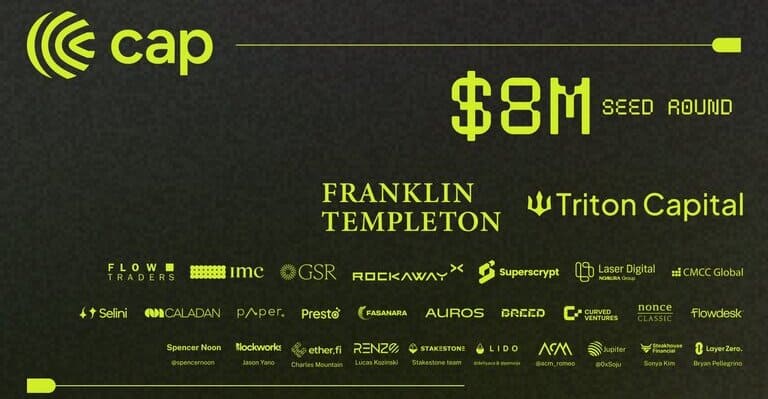TL;DR
- Cap raised a total of $11 million, backed by Franklin Templeton and Triton Capital, to develop its yield-bearing stablecoin engine.
- Its model combines crypto-native strategies with traditional financial methods such as algorithmic trading and private credit funds.
- Cap plans to integrate restaking tools through EigenLayer, offering new passive income avenues and expanding access to yield in the blockchain ecosystem.
Cap, a protocol focused on yield-generating stablecoins, has just closed an $11 million funding round. The latest stage, totaling $8 million, included support from well-known financial entities such as Franklin Templeton and Triton Capital. The company had previously raised $3 million, and the newly secured capital will be used to boost the development of its technology.
The main goal of this investment is to launch a stablecoin engine that allows users to generate passive income on their digital assets. Unlike other platforms that rely solely on strategies within the crypto ecosystem, Cap combines resources from both the digital market and traditional financial institutions. Its approach incorporates yield models used by algorithmic trading firms, private credit funds, and other operators that manage large-scale financial flows.
We are excited to announce our $8 million seed round led by @FTDA_US & @triton_xyz with participation from @GSR_io, @flowtraders, @LaserDigital_, @IMCTrading, @Rockaway_X, & @Superscrypt. pic.twitter.com/hbjgaATx29
— cap (@capmoney_) April 7, 2025
Cap Will Offer Restaking Mechanisms with EigenLayer
In addition to integrating external yield sources, Cap plans to offer restaking mechanisms through solutions like EigenLayer. These protocols allow users to lock up assets as collateral to support operations on different blockchains, enabling them to earn rewards. This option aims to broaden the yield-generating tools available to users of its infrastructure.

Institutional Adoption of Stablecoins
Stablecoins have once again attracted the attention of major firms and public entities. Fidelity, World-Liberty Financial — linked to former President Donald Trump — and the state of Wyoming have expressed their intent to issue their own stablecoins. At the same time, the U.S. Congress is evaluating specific regulatory frameworks for these assets, which could mark a new phase for the crypto industry.
Cap’s proposal responds to the market’s growing demand and ongoing transformation. Its model combines advanced financial tools with blockchain-based solutions tailored for everyday users.

